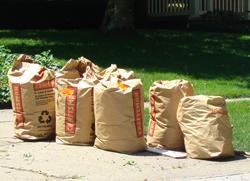Waste Management is developing a new organics facility in Okeechobee, Florida. The facility, which will sit on eight acres, will process yard, food and clean wood waste to produce soil amendments as well as bagged lawn and garden products that may be sold back to the public as an alternative to chemical fertilizers. The facility will be sited adjacent to Waste Management’s existing Okeechobee Landfill operation and will be the company’s first attempt at a dedicated composting site and should be operational by spring of 2011.
 “We want to extract the highest value possible from the materials we manage. Recycling organics through composting and other technologies that may produce energy, transportation fuels or specialty chemicals enables us to generate more value from this specific material stream,” said Tim Hawkins, market area vice president for Waste Management. “With this facility, we will be able to offer southern Florida customers dedicated organics processing capability as well as generate beneficially useful products such as nutrient-rich organic compost that can close the loop with local homes and businesses in South Florida.”
“We want to extract the highest value possible from the materials we manage. Recycling organics through composting and other technologies that may produce energy, transportation fuels or specialty chemicals enables us to generate more value from this specific material stream,” said Tim Hawkins, market area vice president for Waste Management. “With this facility, we will be able to offer southern Florida customers dedicated organics processing capability as well as generate beneficially useful products such as nutrient-rich organic compost that can close the loop with local homes and businesses in South Florida.”
Recycling is becoming more and more important in waste management and companies are looking for creative and cost effective ways to reduce waste and lessen environmental impact. Waste Management (WM) is looking at organics recycling as one possible solution to both waste management but also as a new revenue stream. To accelerate their pathway into the marketplace, WM acquired a major equity interest in Garick LLC, a manufacturer, marketer and distributor of organic lawn and garden products. In addition, the company has invested in technologies to convert waste into transportation fuels, petrochemicals and chemicals.
According to WM, North America generates over 80 million tons of organic waste each year. In the United States, approximately a third of municipal solid waste is organic, including food, yard and wood waste. Approximately 65 percent of yard waste and 2.5 percent of food waste collected in the United States is currently diverted from disposal.

